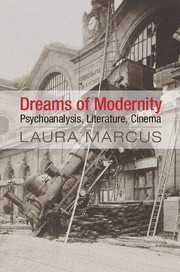Book contents
- Frontmatter
- Dedication
- Contents
- Acknowledgements
- Introduction
- Chapter 1 The Lodger
- Chapter 2 Oedipus Express
- Chapter 3 Railway Reading
- Chapter 4 ‘From Autumn to Spring, Aesthetics Change’
- Chapter 5 ‘A Hymn to Movement’
- Chapter 6 Staging the ‘Private Theatre’
- Chapter 7 The Newness of the ‘New Biography’
- Chapter 8 European Witness
- Chapter 9 Dreaming and Cinematographic Consciousness
- Chapter 10 Directed Dreaming
- Chapter 11 ‘In the Circle of the Lens’
- Chapter 12 Virginia Woolf and the Art of the Novel
- Index
- References
Chapter 2 - Oedipus Express
Psychoanalysis and the Railways
Published online by Cambridge University Press: 05 November 2014
- Frontmatter
- Dedication
- Contents
- Acknowledgements
- Introduction
- Chapter 1 The Lodger
- Chapter 2 Oedipus Express
- Chapter 3 Railway Reading
- Chapter 4 ‘From Autumn to Spring, Aesthetics Change’
- Chapter 5 ‘A Hymn to Movement’
- Chapter 6 Staging the ‘Private Theatre’
- Chapter 7 The Newness of the ‘New Biography’
- Chapter 8 European Witness
- Chapter 9 Dreaming and Cinematographic Consciousness
- Chapter 10 Directed Dreaming
- Chapter 11 ‘In the Circle of the Lens’
- Chapter 12 Virginia Woolf and the Art of the Novel
- Index
- References
Summary
In the cultural narratives of the railway in the nineteenth and early twentieth centuries, the categories of shock and trauma – which were often differentiated, though not in consistent ways – were central. Freud’s Three Essays on the Theory of Sexuality contain a striking example of the swerve from the anticipated account of the railway as a vehicle for smooth linear progress to a model which emphasizes ‘mechanical agitation of the body’. Although Freud’s account described a very specific historical trajectory – railway travel arouses sexual impulses in the male child which are subsequently repressed and re-emerge as railway anxiety – the model of shock (here ‘mechanical agitation’) is not only inseparable from the discourses of the railway, but emerges at a number of historical junctures. These include the 1860s, when ‘railway shock’ was extensively conceptualized and when the discourse of fictional ‘sensation’ reached its height; the 1890s, when the nineteenth-century obsession with nerves and nervousness met the languages of degeneration; the 1920s, when Freud, Benjamin and others most substantially theorized the concept of ‘shock’; and the present day, when we retrace a certain history of modernity as a history of shock, fragmentation, dispersal, heterogeneity.
The following text was published in 1884:
The man, for the time being, becomes a part of the machine in which he has placed himself, being jarred by the self-same movement, and receiving impressions upon nerves of skin and muscle which are none the less real because they are unconsciously inflicted.
These lines, published in 1884, are, as Wolfgang Schivelbusch’s study suggests, indicative of the concern in the last decades of the nineteenth century with the effects of rail travel on passengers and railway personnel. The terms of the quotation construct a striking logic of equivalence: man and machine are ‘jarred by the self-same movement’. If, to take up Schivelbusch’s arguments, the railway destroyed the mimetic relationship between preindustrial transport and natural phenomena in its felt ‘annihilation of time and space’, mimesis insistently returns in the equivalence between, and perceived interchangeability of, human and machine organisms.
- Type
- Chapter
- Information
- Dreams of ModernityPsychoanalysis, Literature, Cinema, pp. 41 - 58Publisher: Cambridge University PressPrint publication year: 2014



